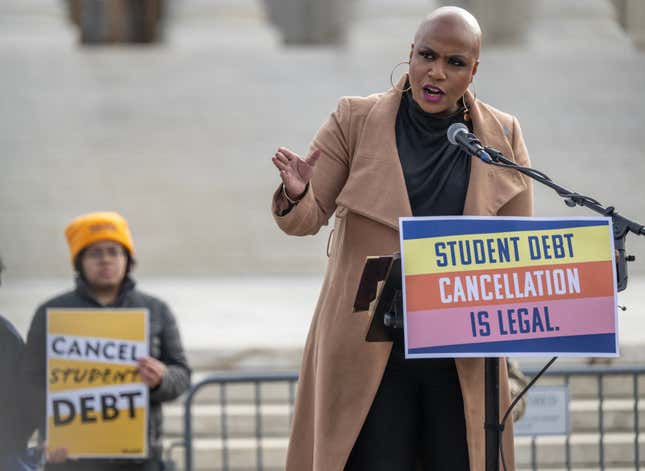
After three years, the federal student loan freeze is coming to an end — meaning borrowers will have to restart paying their loans come October 1st. Americans owe a collective $1.75 trillion in student loan debt, a disproportionate number of which sits on the shoulders of Black women.
Progressives like Representative Ayanna Pressley (D-MA) want borrowers to know they’re not alone. Ahead of the freeze ending, the Massachusetts Congresswoman is making an appeal for student debt forgiveness.
“I’m going to continue to press for relief that goes as deep as the scale of the crisis,” Pressley told The Root, “for a response that goes as deep as the hurt is.”
On Friday, the Congresswoman is convening a panel on debt cancellation during the 52nd Congressional Black Caucus Foundation Legislative Conference. “Understanding the real financial pain and angst that borrowers are experience,” she says, “we wanted to convene this panel, to one make clear and continue to fight for broad-based cancellation and also to make sure we move forward in this moment that people are aware of the relief that is out there.”
Black Women & Student Loan Debt
Black women will bear the brunt of the student loan freeze ending. Black women with a bachelor’s degree have an average of $38,000 in student loan debt. Black women with a master’s degree have an average of $58,000 in student loan debt, according to Education Trust.
“Black women are the most burdened by student loan debt,” says Rep. Pressley. “The largest two-thirds of this $2 trillion crisis of this crisis is on the shoulders of women writ-large.”
However, Black women aren’t the only groups impacted by the freeze ending. “This crisis has impacted people from every walk of life,” says the Congresswoman, “disproportionately impacting Black borrowers because the student debt crisis is a direct result of racist and anti-Black policies and the systemic divestment in education in America.”
How Can Borrowers Seek Relief?
As student borrowers prepare to resume their loan payments, Pressley also stressed that there are options out there to help. Borrowers can access income-driven repayment plans like the SAVE program, which allows you to decrease your monthly payments significantly. People in qualifying government and non-profit roles can also apply for the Public Service Loan Forgiveness Program.
The U.S. Department of Education’s Loan Simulator and Studentaid.gov can also provide information on ways to access relief.
No Days Off!
As the end of the student loan freeze draws closer, Rep. Pressley says she’s determined to keep fighting for borrowers.
“There’s panic, and people feel like they’re gonna fall off the financial cliff,” she says. “So I’m not taking any days off because borrowers, the American people, and certainly Black borrowers are not taking any days off from this burdensome exhausting debt that is choking the promise of our families and our communities.”

